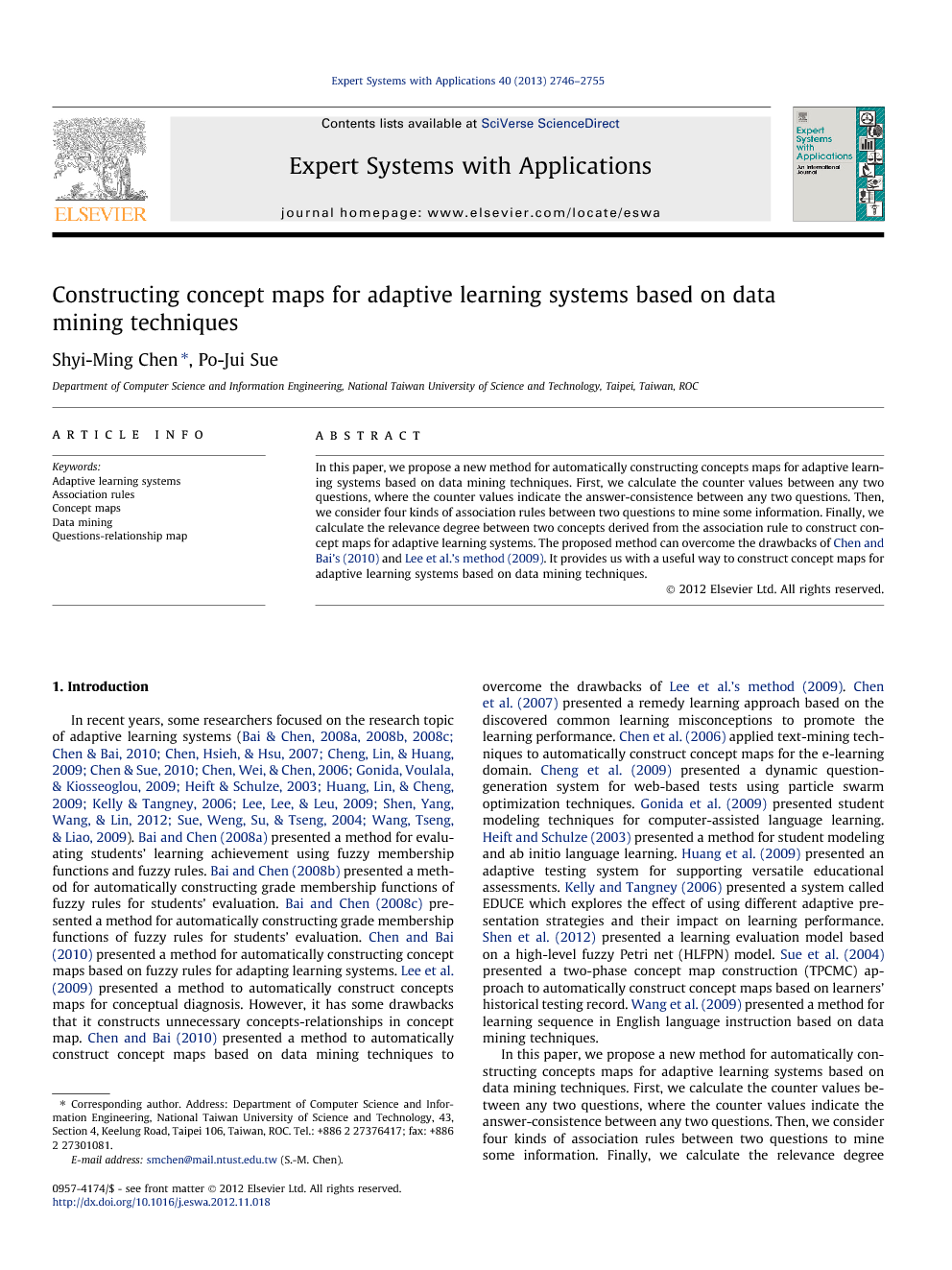In this paper, we propose a new method for automatically constructing concepts maps for adaptive learning systems based on data mining techniques. First, we calculate the counter values between any two questions, where the counter values indicate the answer-consistence between any two questions. Then, we consider four kinds of association rules between two questions to mine some information. Finally, we calculate the relevance degree between two concepts derived from the association rule to construct concept maps for adaptive learning systems. The proposed method can overcome the drawbacks of Chen and Bai’s (2010) and Lee et al.’s method (2009). It provides us with a useful way to construct concept maps for adaptive learning systems based on data mining techniques
In recent years, some researchers focused on the research topic of adaptive learning systems (Bai and Chen, 2008a, Bai and Chen, 2008b, Bai and Chen, 2008c, Chen and Bai, 2010, Chen et al., 2007, Cheng et al., 2009, Chen and Sue, 2010, Chen et al., 2006, Gonida et al., 2009, Heift and Schulze, 2003, Huang et al., 2009, Kelly and Tangney, 2006, Lee et al., 2009, Shen et al., 2012, Sue et al., 2004 and Wang et al., 2009). Bai and Chen (2008a) presented a method for evaluating students’ learning achievement using fuzzy membership functions and fuzzy rules. Bai and Chen (2008b) presented a method for automatically constructing grade membership functions of fuzzy rules for students’ evaluation. Bai and Chen (2008c) presented a method for automatically constructing grade membership functions of fuzzy rules for students’ evaluation. Chen and Bai (2010) presented a method for automatically constructing concept maps based on fuzzy rules for adapting learning systems. Lee et al. (2009) presented a method to automatically construct concepts maps for conceptual diagnosis. However, it has some drawbacks that it constructs unnecessary concepts-relationships in concept map. Chen and Bai (2010) presented a method to automatically construct concept maps based on data mining techniques to overcome the drawbacks of Lee et al.’s method (2009). Chen et al. (2007) presented a remedy learning approach based on the discovered common learning misconceptions to promote the learning performance. Chen et al. (2006) applied text-mining techniques to automatically construct concept maps for the e-learning domain. Cheng et al. (2009) presented a dynamic question-generation system for web-based tests using particle swarm optimization techniques. Gonida et al. (2009) presented student modeling techniques for computer-assisted language learning. Heift and Schulze (2003) presented a method for student modeling and ab initio language learning. Huang et al. (2009) presented an adaptive testing system for supporting versatile educational assessments. Kelly and Tangney (2006) presented a system called EDUCE which explores the effect of using different adaptive presentation strategies and their impact on learning performance. Shen et al. (2012) presented a learning evaluation model based on a high-level fuzzy Petri net (HLFPN) model. Sue et al. (2004) presented a two-phase concept map construction (TPCMC) approach to automatically construct concept maps based on learners’ historical testing record. Wang et al. (2009) presented a method for learning sequence in English language instruction based on data mining techniques.
In this paper, we propose a new method for automatically constructing concepts maps for adaptive learning systems based on data mining techniques. First, we calculate the counter values between any two questions, where the counter values indicate the answer-consistence between any two questions. Then, we consider four kinds of association rules between two questions to mine some information. Finally, we calculate the relevance degree between two concepts derived from the association rule to construct concept maps for adaptive learning systems. The proposed method can overcome the drawbacks of Chen and Bai’s method (2010) and Lee et al’s. method (2009). It provides us with a useful way to construct concept maps for adaptive learning systems based on data mining techniques.
In this paper, we have proposed a new method for automatically constructing concepts maps for adaptive learning systems based on data mining techniques. First, we calculate the counter values between any two questions, where the counter values indicate the answer-consistence between any two questions. Then, we consider four kinds of association rules between two questions to mine some information. Finally, we calculate the relevance degree between two concepts derived from the association rule to construct concept maps for adaptive learning systems. The proposed method can overcome the drawbacks of Chen and Bai’s method (2010) and Lee et al.’s method (2009). It provides us with a useful way to construct concept maps for adaptive learning systems based on data mining techniques.


